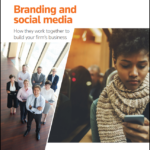
Young Lawyers In Trouble
//
 It’s hard to be a lawyer. Our profession is tough on us mentally, emotionally, and physically. I’d argue it’s especially hard on young attorneys still struggling to figure out their practice and their niche. Associates work long, hard hours under immense pressure. It’s not surprising to think that many struggle with maintaining their desire to practice.
It’s hard to be a lawyer. Our profession is tough on us mentally, emotionally, and physically. I’d argue it’s especially hard on young attorneys still struggling to figure out their practice and their niche. Associates work long, hard hours under immense pressure. It’s not surprising to think that many struggle with maintaining their desire to practice.
But I don’t think anyone was prepared for the recently released results of a survey of young attorneys commissioned by the International Bar Association. The responses on workplace satisfaction were striking — and disturbing. When asked their odds of moving to a new workplace within the next five years, over half, 54%, responded they were somewhat or highly likely to do so. One out of three respondents said they were likely to move to a new branch of the legal profession, such as shifting from private practice to in-house, government, or academia. What’s more, 20% of respondents reported they were likely to leave the practice of law entirely.
googletag.cmd.push( function() { // Enable lazy loading. googletag.pubads().enableLazyLoad({ renderMarginPercent: 150, mobileScaling: 2 }); // Display ad. googletag.display( "div-id-for-top-300x250" ); googletag.enableServices(); });Although most of the respondents were surveyed in countries outside the United States, that doesn’t give me much comfort. The U.S. is reputed as one of the most hard-driving, hard-working business cultures on the planet. I can’t imagine the same survey would have any better results if taken stateside, and it could well be worse. How did we get to the point where one out of five young attorneys is willing to throw away the years of difficult, expensive education they went through to become a lawyer by leaving the practice of law entirely?!
 Sponsored How Legal, Engineering Teams Can Collaborate To Reduce Open Source Risk Our friends at FOSSA provide concrete best practices for law departments in this free white paper. From Above The Law and Fossa
Sponsored How Legal, Engineering Teams Can Collaborate To Reduce Open Source Risk Our friends at FOSSA provide concrete best practices for law departments in this free white paper. From Above The Law and Fossa It’s A Long Way Up
Luckily, the IBA survey contains some of the answers to the questions its headline-making statistics raise. The biggest culprit appears to be young attorneys feeling a lack of ability to better themselves professionally. Fully 90% of young attorneys surveyed reported encountering barriers to their career progression preventing them from having a clear path to the future they wanted. The biggest culprit was a lack of work-life balance at 37%, but close on its heels were lack of mentorship (36%) and lack of opportunities for promotion (31%).
googletag.cmd.push( function() { // Enable lazy loading. googletag.pubads().enableLazyLoad({ renderMarginPercent: 150, mobileScaling: 2 }); // Display ad. googletag.display( "div-id-for-middle-300x250" ); googletag.enableServices(); }); googletag.cmd.push( function() { // Enable lazy loading. googletag.pubads().enableLazyLoad({ renderMarginPercent: 150, mobileScaling: 2 }); // Display ad. googletag.display( "div-id-for-storycontent-440x100" ); googletag.enableServices(); }); googletag.cmd.push( function() { // Enable lazy loading. googletag.pubads().enableLazyLoad({ renderMarginPercent: 150, mobileScaling: 2 }); // Display ad. googletag.display( "div-id-for-in-story-youtube-1x1" ); googletag.enableServices(); });These are some practical concepts worth exploring. Work-life balance is a perennial challenge in law, but one that many firms have been increasingly willing to tackle. Increased flexibility with work-from-home and nontraditional hour structures offer the promise of helping attorneys get their work done on a schedule that meshes better with their home life. Biglaw’s slow creep toward results-oriented billing structures — and away from measuring associate output purely by billable hours and dollars collected — could also help relieve some of that stress from attorneys young and old.
Lifting Up Thoughtfully
Sponsored Sponsored A Complete Guide To Managing Your Trust Account This free report will help you say goodbye to IOLTA angst. From LawPay and Above The Law
Sponsored A Complete Guide To Managing Your Trust Account This free report will help you say goodbye to IOLTA angst. From LawPay and Above The Law  Sponsored Finding Opportunity in Adversity Learn what your law firm can do to be successful and find opportunity in the face of adversity, with this free on demand webcast. From AbovetheLaw And Thomson Reuters
Sponsored Finding Opportunity in Adversity Learn what your law firm can do to be successful and find opportunity in the face of adversity, with this free on demand webcast. From AbovetheLaw And Thomson Reuters  Sponsored Introducing The Complete Legal Tech-To-English Dictionary! From 'AI' to 'CRM' to 'KPI' to 'WISP,' this is your guide to what’s *really* going on in law office technology From Above The Law and Wolters Kluwer
Sponsored Introducing The Complete Legal Tech-To-English Dictionary! From 'AI' to 'CRM' to 'KPI' to 'WISP,' this is your guide to what’s *really* going on in law office technology From Above The Law and Wolters Kluwer  Sponsored Finding Opportunity in Adversity Learn what your law firm can do to be successful and find opportunity in the face of adversity, with this free on demand webcast. From AbovetheLaw And Thomson Reuters
Sponsored Finding Opportunity in Adversity Learn what your law firm can do to be successful and find opportunity in the face of adversity, with this free on demand webcast. From AbovetheLaw And Thomson Reuters The challenges of lack of mentorship and lack of promotion opportunities are likewise curable, but they require real thought and effort to make them effective. It’s easy at a management level to slap together a list matching up associates with partners, declare that a mentorship relationship has been formed, and ask people to meet regularly to work on the associate’s progress. Real mentorships require a significant investment of time and care by both parties, and that can’t just be assigned into existence.
A firm looking to develop its mentoring culture would be better served by finding opportunities to make partners and associates spend time working side-by-side on problems unrelated to just briefing, drafting, and billing. Proximity and time are the magic ingredients to real affinity and friendship. It can be challenging to make that happen during a pandemic and with remote working becoming the norm, but if you find a way to give your people space and time to develop real care for one another, mentoring will naturally follow.
Creating promotion opportunities is also doable. The path to partnership must be achievable. Pumping out massive profits-per-partner to a handful of “chosen lawyers” thwarts this goal. Metrics for making partner should be clear and consistently applied. But it’s more than just becoming partner. Harness what young attorneys are best at: putting energy into identifying and mastering problems that no one else in the firm has yet developed skills in. Give them the chance to become a subject-matter expert on some matter of firm governance, and then give deference to the conclusions they want to run with. We all want to have an impact on the places we spend our time. We want our associates to feel at home, and nothing makes a person feel at home like letting them put new paint on the walls.
googletag.cmd.push( function() { // Enable lazy loading. googletag.pubads().enableLazyLoad({ renderMarginPercent: 150, mobileScaling: 2 }); // Display ad. googletag.display( "div-id-for-bottom-300x250" ); googletag.enableServices(); });It’s Not Just In Their Heads
Lastly, the nature of this survey itself should give us some hope. Every piece of data in the survey is a self-reported feeling, not an objective reflection of a concrete fact. Temperature is an objective measurement; whether we feel hot or cold is up to us. To be clear, the problems need to be addressed either way. Young attorneys leaving, and taking their knowledge, skills, and potential with them. Firms thus need to make the structural changes to address the problems and then work on ensuring that young attorneys understand how the firm is evolving to address those needs — and how the firms will back it up with actions.
Sponsored Sponsored How Branding And Social Media Can Build Your Firm’s Business Download this free eBook from our friends at Thomson Reuters, and learn to use social media to win new clients. From Above the Law and Thomson Reuters
Sponsored How Branding And Social Media Can Build Your Firm’s Business Download this free eBook from our friends at Thomson Reuters, and learn to use social media to win new clients. From Above the Law and Thomson Reuters  Sponsored How Legal, Engineering Teams Can Collaborate To Reduce Open Source Risk Our friends at FOSSA provide concrete best practices for law departments in this free white paper. From Above The Law and Fossa
Sponsored How Legal, Engineering Teams Can Collaborate To Reduce Open Source Risk Our friends at FOSSA provide concrete best practices for law departments in this free white paper. From Above The Law and Fossa As with so many problems in law firms, the cure really comes down to cultivating a strong firm culture. When our teams feel cared about, when they lift one another up and empower each other, all the seemingly impossible problems tend to become less significant.
 James Goodnow is the CEO and managing partner of NLJ 250 firm Fennemore Craig. At age 36, he became the youngest known chief executive of a large law firm in the U.S. He holds his JD from Harvard Law School and dual business management certificates from MIT. He’s currently attending the Cambridge University Judge Business School (U.K.), where he’s working toward a master’s degree in entrepreneurship. James is the co-author of Motivating Millennials, which hit number one on Amazon in the business management new release category. As a practitioner, he and his colleagues created and run a tech-based plaintiffs’ practice and business model. You can connect with James on Twitter (@JamesGoodnow) or by emailing him at [email protected].
James Goodnow is the CEO and managing partner of NLJ 250 firm Fennemore Craig. At age 36, he became the youngest known chief executive of a large law firm in the U.S. He holds his JD from Harvard Law School and dual business management certificates from MIT. He’s currently attending the Cambridge University Judge Business School (U.K.), where he’s working toward a master’s degree in entrepreneurship. James is the co-author of Motivating Millennials, which hit number one on Amazon in the business management new release category. As a practitioner, he and his colleagues created and run a tech-based plaintiffs’ practice and business model. You can connect with James on Twitter (@JamesGoodnow) or by emailing him at [email protected].
Biglaw, Health & Wellness, James Goodnow, Mental Health, Work-life balance
Introducing Jobbguru: Your Gateway to Career Success
The ultimate job platform is designed to connect job seekers with their dream career opportunities. Whether you're a recent graduate, a seasoned professional, or someone seeking a career change, Jobbguru provides you with the tools and resources to navigate the job market with ease.
Take the next step in your career with Jobbguru:
Don't let the perfect job opportunity pass you by. Join Jobbguru today and unlock a world of career possibilities. Start your journey towards professional success and discover your dream job with Jobbguru.
Originally posted on: https://abovethelaw.com/2022/02/young-lawyers-in-trouble/